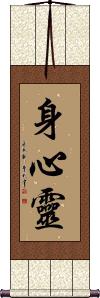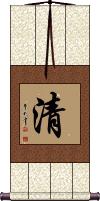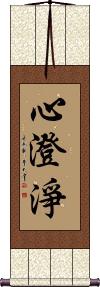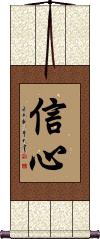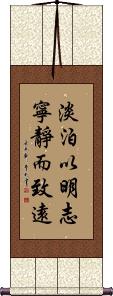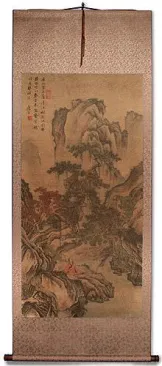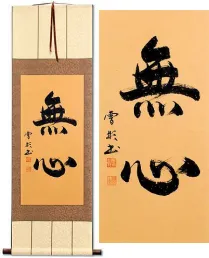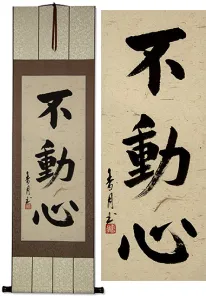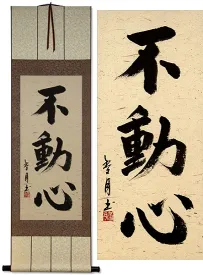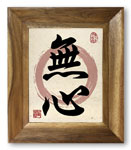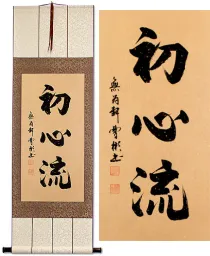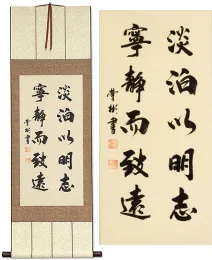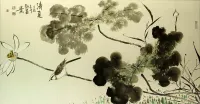Many custom options...
And formats...

Clear Mind in Chinese / Japanese...
Buy a Clear Mind calligraphy wall scroll here!
Personalize your custom “Clear Mind” project by clicking the button next to your favorite “Clear Mind” title below...
Mind Body Spirit
身心靈 is probably the best way to express the idea of “Body, Mind, and Spirit” in Chinese and old Korean Hanja. We are actually using the word “heart” here because, for thousands of years, the heart was thought to be the place where your thoughts, feelings, and emotions came from. We do something similar in the west when we say “warm-hearted” or “I love you with all of my heart.” In this context, heart = mind in Asian language and culture.
The very literal translation of these three characters is “body, heart & spirit,” which could also be interpreted as “body, mind & soul.”
We have arranged these characters in this order because it simply “feels” like the proper order in the Chinese language. Word lists like this are not so common for calligraphy artwork, so we must be careful to put them in the most natural order. It should be noted that this is not a common title in Asia, nor is it considered an actual phrase (as it lacks a clear subject, verb, and object).
![]() In Japanese Kanji, they use an alternate form of the character for soul or spirit. If you want this using the Japanese alternate, please click on the Kanji shown to the right instead of the button above.
In Japanese Kanji, they use an alternate form of the character for soul or spirit. If you want this using the Japanese alternate, please click on the Kanji shown to the right instead of the button above.
Japanese disclaimer: This is not a natural phrase/list in Japanese. While not totally-natural in Chinese, this word list is best if your audience is Chinese.
Clarity
清 is a word that means clarity or clear in Chinese, Japanese Kanji, and old Korean Hanja.
Looking at the parts of this character, you have three splashes of water on the left, “life” on the top right, and the moon on the lower right.
Because of something Confucius said about 2500 years ago, you can imagine that this character means “live life with clarity like bright moonlight piercing pure water.” The Confucian idea is something like “Keep clear what is pure in yourself, and let your pure nature show through.” Kind of like saying, “Don't pollute your mind or body, so that they remain clear.”
This might be stretching the definition of this single Chinese character but the elements are there, and “clarity” is a powerful idea.
Korean note: Korean pronunciation is given above but this character is written with a slight difference in the "moon radical" in Korean. However, anyone who can read Korean Hanja, will understand this character with no problem (this is considered an alternate form in Korean). If you want the more standard Korean Hanja form (which is an alternate form in Chinese), just let me know.
Japanese note: When reading in Japanese, this Kanji has additional meanings of pure, purify, or cleanse (sometimes to remove demons or "exorcise"). Used more in compound words in Japanese than as a stand-alone Kanji.
Purity of Mind
心澄淨 is the Buddhist concept of the pure and calm mind. It is believed that once you achieve a meditative state of pure focused thought, the mind becomes clear and calm. Although, others will say this means that achieving a calm mind will allow you to reach pure thought.
From Sanskrit, this is known as citta-prasāda. The concept of citta-prasāda is sometimes defined as “clear heart-mind,” or “the single and definitive aspiration.”
Confidence / Faithful Heart
信心 is a Chinese, Japanese, and Korean word that means confidence, faith, or belief in somebody or something.
The first character means faith, and the second can mean heart or soul. Therefore, you could say this means “faithful heart” or “faithful soul.”
In Korean especially, this word has a religious connotation.
In the old Japanese Buddhist context, this was a word for citta-prasāda (clear or pure heart-mind).
In modern Japan (when read by non-Buddhists), this word is usually understood as “faith,” “belief,” or “devotion.”
See Also: Self-Confidence
A Life of Serenity Yields Understanding
淡泊以明志寧靜而致遠 is a kind of complex ten-character proverb composed by Zhuge Liang about 1800 years ago.
This is a Chinese proverb that means “Leading a simple life will yield a clear mind, and having inner peace will help you see far (into the world).”
What I have translated as “simple life” means NOT being materialistic and NOT competing in the rat race.
The last word means “far” but the deeper meaning is that you will surpass what you can currently see or understand. Perhaps even the idea of opening up vast knowledge and understanding of complex ideas.
The whole phrase has a theme that suggests if you are NOT an aggressive cut-throat person who fights his way to the top no matter how many people he crushes on the way, and instead seek inner peace, you will have a happier existence and be more likely to understand the meaning of life.
See Also: Serenity
This in-stock artwork might be what you are looking for, and ships right away...
Gallery Price: $106.00
Your Price: $58.88
Gallery Price: $400.00
Your Price: $138.88
Gallery Price: $169.00
Your Price: $93.88
Gallery Price: $169.00
Your Price: $93.88
Gallery Price: $200.00
Your Price: $118.88
Gallery Price: $200.00
Your Price: $118.88
Gallery Price: $202.00
Your Price: $111.88
Gallery Price: $106.00
Your Price: $58.88
Gallery Price: $79.00
Your Price: $43.88
Gallery Price: $198.00
Your Price: $109.88
Not the results for clear mind that you were looking for?
Below are some entries from our dictionary that may match your clear mind search...
| Characters If shown, 2nd row is Simp. Chinese |
Pronunciation Romanization |
Simple Dictionary Definition |
十住 see styles |
shí zhù shi2 zhu4 shih chu jū jū |
The ten stages, or periods, in bodhisattva-wisdom, prajñā 般若, are the 十住; the merits or character attained are the 十地 q.v. Two interpretations may be given. In the first of these, the first four stages are likened to entry into the holy womb, the next four to the period of gestation, the ninth to birth, and the tenth to the washing or baptism with the water of wisdom, e.g. the baptism of a Kṣatriya prince. The ten stages are (1) 發心住 the purposive stage, the mind set upon Buddhahood; (2) 治地住 clear understanding and mental control; (3) 修行住 unhampered liberty in every direction; (4) 生貴住 acquiring the Tathāgata nature or seed; (5) 方便具足住 perfect adaptability and resemblance in self-development and development of others; (6) 正心住 the whole mind becoming Buddha-like; (7) 不退住 no retrogression, perfect unity and constant progress; (8) 童眞住 as a Buddha-son now complete; (9) 法王子住 as prince of the law; (10) 灌頂住 baptism as such, e.g. the consecration of kings. Another interpretation of the above is: (1) spiritual resolve, stage of śrota-āpanna; (2) submission to rule, preparation for Sakṛdāgāmin stage; (3) cultivation of virtue, attainment of Sakṛdāgāmin stage; (4) noble birth, preparation for the anāgāmin stage; (5) perfect means, attainment of anāgāmin stage; (6) right mind, preparation for arhatship; (7) no-retrogradation, the attainment of arhatship; (8) immortal youth, pratyekabuddhahood; (9) son of the law-king, the conception of bodhisattvahood; (10) baptism as the summit of attainment, the conception of Buddhahood. |
女人 see styles |
nǚ ren nu:3 ren5 nü jen nyonin; jojin にょにん; じょじん |
wife woman Woman, described in the Nirvāṇa sūtra 浬槃經 9 as the "abode of all evil", 一切女人皆是衆惡之所住處 The 智度論 14 says: 大火燒人是猶可近, 淸風無形是亦可捉, 蚖蛇含毒猶亦可觸, 女人之心不可得實 "Fierce fire that would burn men may yet be approached, clear breezes without form may yet be grasped, cobras that harbour poison may yet be touched, but a woman's heart is never to be relied upon." The Buddha ordered Ānanda: "Do not Look at a woman; if you must, then do not talk with her; if you must, then call on the Buddha with all your mind"— an evidently apocryphal statement of 文句 8. |
心水 see styles |
xīn shuǐ xin1 shui3 hsin shui motomi もとみ |
(female given name) Motomi The mind as a reflecting water-surface; also the mind as water, clear or turbids. |
心竅 心窍 see styles |
xīn qiào xin1 qiao4 hsin ch`iao hsin chiao |
the mind; capacity for clear thinking |
性心 see styles |
xìng xīn xing4 xin1 hsing hsin shōshin |
The perfectly clear and unsullied mind, i. e. the Buddha mind or heart. The Chan (Zen) school use 性心 or 心性 indifferently. |
止觀 止观 see styles |
zhǐ guān zhi3 guan1 chih kuan shikan |
奢摩他毗婆舍那 (or 奢摩他毗鉢舍那) śamatha-vipaśyanā, which Sanskrit words are intp. by 止觀; 定慧; 寂照; and 明靜; for their respective meanings see 止 and 觀. When the physical organism is at rest it is called 止 zhi, when the mind is seeing clearly it is called 觀 guan. The term and form of meditation is specially connected with its chief exponent, the founder of the Tiantai school, which school is styled 止觀宗 Zhiguan Zong, its chief object being concentration of the mind by special methods for the purpose of clear insight into truth, and to be rid of illusion. The Tiantai work gives ten fields of mediation, or concentration: (1) the 五陰, 十八界, and 十二入; (2) passion and delusion; (3) sickness; (4) karma forms; (5) māra-deeds; (6) dhyāna; (7) (wrong) theories; (8) arrogance; (9) the two Vehicles; (10) bodhisattvahood. |
靈醒 灵醒 see styles |
líng xǐng ling2 xing3 ling hsing |
(of senses, mind etc) alert; keen; clear-minded |
天眞獨朗 天眞独朗 see styles |
tiān zhēn dú lǎng tian1 zhen1 du2 lang3 t`ien chen tu lang tien chen tu lang tenshin dokurō |
The fundamental reality or bhūtatathatā, is the only illumination. It is a dictum of 道邃 Daosui of the Tang to the famous Japanese monk 傳教 Dengyō. The apprehension of this fundamental reality makes all things clear, including the universality of Buddha- hood. It also interprets the phrase 一心三觀 that 空中假 the void, the 'mean ', the seeming, are all aspects of the one mind. |
提神醒腦 提神醒脑 see styles |
tí shén xǐng nǎo ti2 shen2 xing3 nao3 t`i shen hsing nao ti shen hsing nao |
to refresh and clear the mind (idiom); invigorating; bracing |
有的放矢 see styles |
yǒu dì fàng shǐ you3 di4 fang4 shi3 yu ti fang shih |
lit. to have a target in mind when shooting one's arrows (idiom); fig. to have a clear objective |
無想無念 see styles |
musoumunen / musomunen むそうむねん |
(noun - becomes adjective with の) (yoji) being free from all distracting thoughts; keeping one's mind clear of all worldly thoughts; being free from all ideas and thoughts |
Variations: |
shintoumekkyakusurebahimomatasuzushi / shintomekkyakusurebahimomatasuzushi しんとうめっきゃくすればひもまたすずし |
(expression) (proverb) if you clear your mind of all worldly thoughts, even fire will feel cool |
Variations: |
shintouomekkyakusurebahimomatasuzushi / shintoomekkyakusurebahimomatasuzushi しんとうをめっきゃくすればひもまたすずし |
(expression) (proverb) (See 心頭滅却) if you clear your mind of all worldly thoughts, even fire will feel cool |
The following table may be helpful for those studying Chinese or Japanese...
| Title | Characters | Romaji (Romanized Japanese) | Various forms of Romanized Chinese | |
| Mind Body Spirit | 身心靈 / 身心霊 身心灵 | mi shin rei mishinrei | shēn xīn líng shen1 xin1 ling2 shen xin ling shenxinling | shen hsin ling shenhsinling |
| Clarity | 清 | sei | qīng / qing1 / qing | ch`ing / ching |
| Purity of Mind | 心澄淨 | shin chou jou shinchoujou shin cho jo | xīn chéng jìng xin1 cheng2 jing4 xin cheng jing xinchengjing | hsin ch`eng ching hsinchengching hsin cheng ching |
| Confidence Faithful Heart | 信心 | shin jin / shinjin | xìn xīn / xin4 xin1 / xin xin / xinxin | hsin hsin / hsinhsin |
| A Life of Serenity Yields Understanding | 淡泊以明志寧靜而致遠 淡泊以明志宁静而致远 | dàn bó yǐ míng zhì, níng jìng ér zhì yuǎn dan4 bo2 yi3 ming2 zhi4, ning2 jing4 er2 zhi4 yuan3 dan bo yi ming zhi, ning jing er zhi yuan | tan po i ming chih, ning ching erh chih yüan | |
| In some entries above you will see that characters have different versions above and below a line. In these cases, the characters above the line are Traditional Chinese, while the ones below are Simplified Chinese. | ||||
Successful Chinese Character and Japanese Kanji calligraphy searches within the last few hours...
